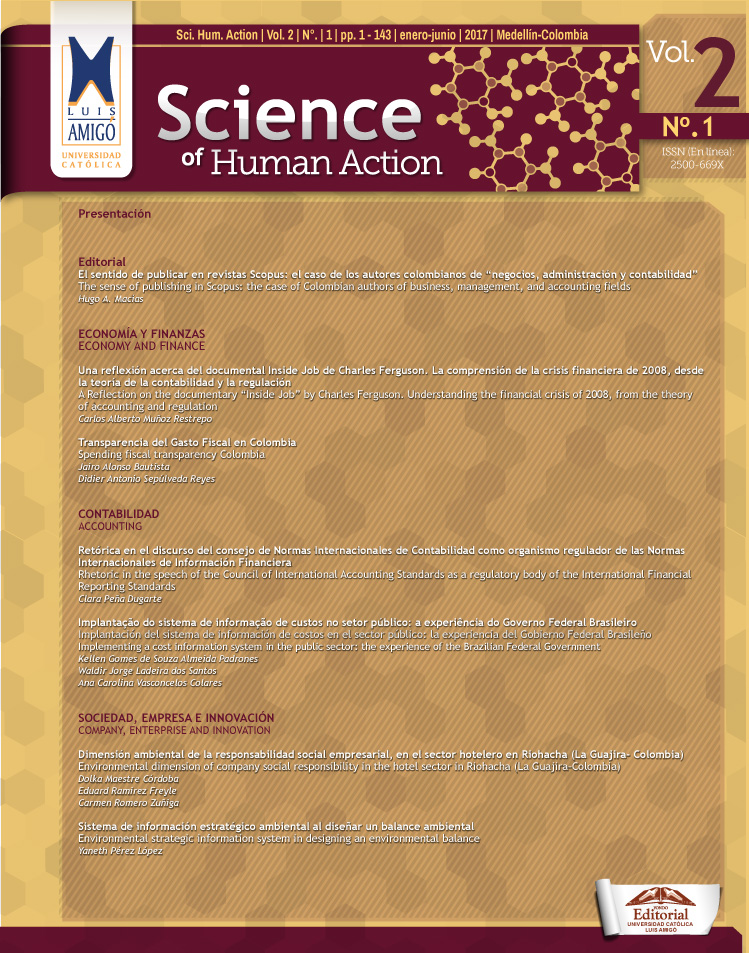Environmental strategic information system in designing an environmental balance
DOI:
https://doi.org/10.21501/2500-669X.2325Keywords:
Environmental balance, eco-efficiency, information systems, strategic planning.Abstract
Economic globalization has generated changes in organizations, the importance of having a comprehensive manager with strategic, organizational and leadership competences, as an essential and distinguishing element in a highly competitive market, added to the need for strategic planning based on a general overview and strategic diagnosis.
That perception is vital for any company interested in being attractive to all market actors, it should be careful and projects itself so that the impact will become a positive factor that will remain it above its competitors, and at the same time it will be in the first place of customers and users’ mind at the time of making purchasing decisions.
In this paper the information system of a dairy enterprise is analyzed, based on the environmental management system of the company, that identifies a research problem framed in the principles of eco-efficiency as an element for the construction of an Environmental Balance.
Downloads
References
Accountability. (2013). El compromiso con los stakeholders. Recuperado el 23 de Agosto de 2014, de http://www.accountability.org/images/content/2/0/204.pdf
Alpina Productos Alimenticios S. A. (2014). Informe de Sostenibilidad 2013. Recuperado de http://informesostenibilidadalpina.com/informe_completo/images/informe_sostenibilidad_alpina_completo_2013.pdf
Alpina S. A. (2012). Informe de Sostenibilidad 2011. Recuperado de http://www.cecodes.org.co/reportes/archivos/alpina/Informe-de-Sostenibilidad-2011.pdf
Consejo Empresarial Colombiano para el Desarrollo Sostenible, CECODES. (2011). Informe de Sostenibilidad 2011. Recuperado de
http://www.cecodes.org.co/reportes/archivos/alpina/Informe-de-Sostenibilidad-2011.pdf
Consejo Empresarial Colombiano para el Desarrollo Sostenible, CODECES. (2009). Cambiando el Rumbo 2009. Bogotá: CODECES.
Checkland, P. (1980). Working Paper: Formulating Problems for Systems Analysis. IIASA–International Institute for Applied Systems Analysis.
Fundación Fòrum Ambiental. (1999). Contabiliad Ambiental: Medida, Evaluación y Comunicación de la Actuación Ambiental de la Empresa. Barcelona: IDEC.
Mogollón, G., & Vergara, L. (2007). Diseño de un estado de propósito especial ambiental para la industria de lácteos. Equidad y Desarrollo, 99-111.
Ordoñez, R. (2013). Alpina Productos Alimenticios S. A. Una Organización Corporativa. Recuperado de http://ribuc.ucp.edu.co:8080/jspui/bitstream/handle/10785/1662/ALPINA%20PRODCUTOS%20ALIMENTICOS%20S%20A%20informe%20de%20practica%20terminado.pdf?sequence=1
Revista Dinero. (2009). Empresas sostenibles: del dicho al hecho.
Revista Dinero, Especial Comercial, 04/30/2009. Recuperado de http://www.dinero.com/edicion-impresa/especial-comercial/articulo/empresas-sostenibles-del-dicho-hecho/77403
Zambrano, A. (2012). Procesos lácteos, disponible en http://agroindustria.jimdo. com/procesos/.
Downloads
Published
How to Cite
Issue
Section
License
PUBLICATIONS POLICY
• The author must send completed the declaration of transfer of economic rights and declaration of conflicts of interest, which will be provided by the management of the magazine. This document indicates the originality of the article, which is not published in another medium and that is not simultaneously postulated in another journal.
• The author will transfer all rights to the article to the journal Science Of Human Action.
• Once the evaluation of the article has begun, the authors agree not to withdraw it until the end of the process.
• The Science Of Human Action journal will submit the articles received for initial evaluation by the Editorial Committee, in case the Committee finds the material pertinent, it will be evaluated by two anonymous referees who will determine if it is publishable. If one referee approves and the other rejects it, a third party will be appointed.
• The address of Science Of Human Action will answer within a maximum of three (3) days about the receipt of the contribution received from the author.
• Printed items will not be received. All the proponents will have to send their writings through the e-mail of the magazine.
• Partial versions of the text will not be received, that is, those that are not structurally adjusted to the type of article.
• Once the article is sent, it is understood that the author authorizes the publication of these data.
• The reception of articles does not imply an obligation to publish them. The authors are directly responsible for the ideas, judgments and opinions expressed in the articles; in such a way that the content does not compromise the thinking of the Editorial Committee or the Institution.
• Once the article is submitted, it is understood that the author authorizes the publication of the data corresponding to the author's note.
• This is an open access journal that does not charge authors for either the editorial process or the publication. All costs of editorial production are assumed by the Luis Amigó Catholic University.
ETHICS OF PUBLICATION
• The Editorial Committee, by virtue of transparency in the processes, will ensure the academic quality of the journal.
• Causes of rejection are considered: plagiarism, adulteration, invention or falsification of content and author data, which are not original and unpublished.
• In no case, the journal's management will require the author to cite it or publish articles with conflicts of interest.
• If once the article is published: 1) the author discovers substantive errors that threaten the quality or scientificity, may request its removal or correction. 2) If a third party detects the error, it is the obligation of the author to retract immediately and proceed to the public removal or correction.


